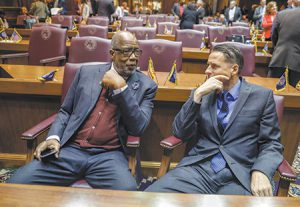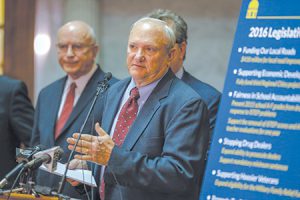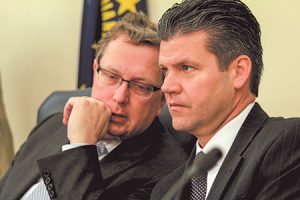Ed Feigenbaum: Look for evolutionary, not revolutionary, changes under legislative leaders
Three of the four leaders are “legislative legacies” of sorts, raised with a respect for “the system” and a sense of public service and selflessness.
Three of the four leaders are “legislative legacies” of sorts, raised with a respect for “the system” and a sense of public service and selflessness.

Rep. Charlie Brown, D-Gary, first elected in 1982, is one of several lawmakers who will not run again. While he’s unfamiliar to most outside Lake County, he leaves a fascinating legacy and one of importance not just in Lake County and the Statehouse, but for people in Indianapolis.
With so many leading lawmakers with long years of experience in conference-committee deliberations leaving and being replaced by those who have played only supporting roles in recent sessions, we’re seeing a change in how conference committees operate.
Now that Hoosiers can purchase alcohol at retail on Sundays thanks to (technically) emergency legislation signed into law even before conference committees had begun to convene, some even question why legislators should stay in Indianapolis through March 14.

Even with split control of the legislative branch (or legislative and executive branches), Hoosiers have become accustomed to fiscal pragmatism from both Democrats and Republicans. Much credit is due to legislative leaders, including those overseeing taxes and spending.
Last year, you learned about the state’s youngest Democratic and Republican legislators teaming up to form the Indiana Future Caucus. They sought to address future-focused issues affecting young Hoosiers across party lines—the implications of which are becoming clear to their more senior colleagues. “This new economy affects [us] in so many ways,” Rep. Todd Huston, […]
Rep. Ed Soliday, R-Valparaiso, is leading the state’s effort to create rules for autonomous vehicle use in Indiana.
This is the time when tensions can rise and the process can break down over assorted concerns.
Rep. David Ober isn’t destined to remain a lawmaker. He’s asked the IURC Nominating Committee (four former legislators are among its seven members) for its consideration to fill the IURC vacancy.
Contrary to popular public belief, the session’s driving issue is not Sunday-alcohol or cold-beer sales expansion.
With income down $558.3 million from less than a decade ago—and gambling-related employment and state and local tax collections reeling accordingly—some lawmakers are looking to recharge the state’s gambling industry.
Former state Sen. Beverly Gard has been deftly wrangling her former colleagues as she leads a commission considering changes in the state’s alcohol laws.

In the long run, no changes will be more important than the Senate fiscal posts.
If you thought the state’s transportation woes and future needs were magically resolved via passage of the mega-funding package, your deficient vision should bar you from driving in the future.
The process works largely because legislative leaders and the governor—regardless of the party in charge—offer benevolent and pragmatic leadership, aberrational overreaches (and overreactions) aside.
Five different tensions typically intersect to shape legislative activity, and will do so again as lawmakers look to leave Indianapolis April 21 or 22.
No one in the regulatory-discretion debate is pleased with extremes taken by their opposites, but a happy philosophical medium is elusive.
The youngest Republican and youngest Democrat in the Indiana House have come together to form the Indiana Future Caucus, which will focus on passing future-focused legislation on issues affecting young Hoosiers across party lines.
History suggests to expect only some tinkering at the margins—although some of those margins might be in the tens of millions of dollars, enough to fund some new initiatives, fully fund former pilot programs, or shore up existing line items.
Just because nothing has yet emerged as a candidate to create chaos for lawmakers in the 2017 session doesn’t mean things will stay sedate.